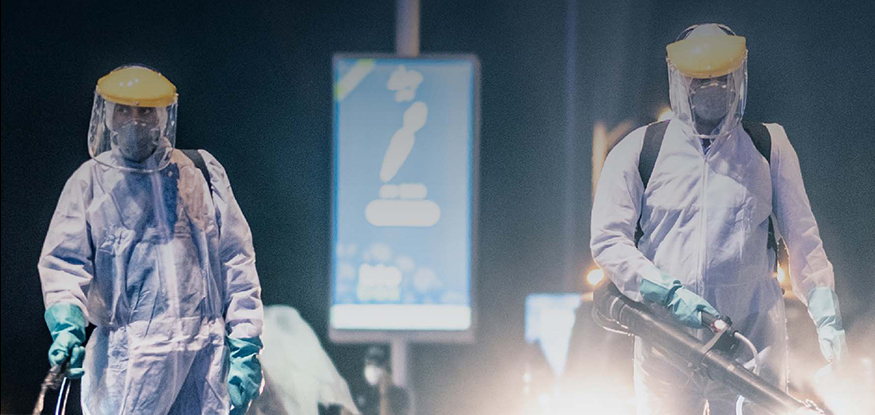The Corona virus-laden two years drastically transformed how the world operated and functioned. Both governments and their citizens were compelled to go through circumstances that had not been figured in the slightest imagination. Overnight, the system of work, education, social lives, travel, and supply chain took a hit, leaving us to reel under utter confusion and potential loss of lives.
Smart Cities World Forum monitored the strategies of countries and cities in how they tackled this unprecedented situation. Unfortunately, many counties failed miserably as they chose to close their countries and stopped visitors from entering for over 2 years, slowing down growth.
The global economy lost nearly $8.5 trillion in output between 2020-21 due to the pandemic and eroded almost all gains of the previous four years. In 2020, global GDP amounted to about $84.97 trillion, almost three trillion lower than in 2019. The sharp economic contraction is being compared to the Great Depression in the 1930, when the worldwide GDP fell by an estimated 15%.
However, in a bid to fight back the pandemic, governments struggled to find the best to solution to tackle the situation. Countries such as New Zealand adopted the zero-covid strategy where as some countries followed strict safety protocol in fighting the virus. Whatever the case may be, the best strategy included reducing the spread of the SARS-CoV-2 coronavirus as much as possible through lockdown once the virus was detected in the community, followed by reopening once cases fell, in combination with a robust system for testing, tracing chains of infection and supporting those who needed self-isolate. Essentially, the best led recovery demanded investments in vaccines, innovative technology, pumping money into national treasury and continued adaptation of economic activity to overcome slackened mobility.
An exemplary example of a country which adopted the above strategies is the United Arab Emirates. The UAE launched the Covid-19 National Vaccination Campaign, an initiative that vaccinated more than 90% of the population, for free. It also hosted the largest and one of first vaccine clinical trials globally, generating results that supported the approval of the most used vaccine world-wide today. All the seven emirates immediately deployed and implemented the planned regulations that were followed by its businesses and citizens. In fact, in 2020, Dubai successfully hosted the GITEX, which was the only physically-attended event in the entire world. This was not just a technological show, but a massive manifestation of the will to go on despite major setbacks. What the event provided were the much needed psychological confidence and moral boost for businesses to carry on albeit under the proper health and safety guidelines set out by the government. Moreover, Abu Dhabi was ranked as the leading city in response to Covdi19 globally, among other 50 cities in response to the COVID-19 pandemic, according to the London-based analytics consortium, Deep Knowledge Group (DKG). It also went on to add that the emirate’s private and public sectors’ joint efforts supported the development of the healthcare sector and to stabilize Abu Dhabi’s economy throughout the pandemic. Moreover, the Dubai Expo 2020 that took place during the pandemic, has significantly benefited the UAE’s foreign trade sector and has strengthened its stature as a preferred business destination, established partnerships with other countries and opened up to international markets. The UAE’s non-oil foreign trade stood at AED1.9 trillion in 2021, a growth of 27% compared to 2020, with non-oil exports increasing by 33% and surpassing a value of AED354 billion for the first time in the country’s history.
The duties of a mayor or government and corporate managers are alike – they all have to manage people albeit at varying degrees. Authorities have to work responsibly for the good of their citizens, the residents or even the visitors.
Going forward, countries who failed to perform efficiently should not shy away from adopting the successful models of countries that performed well in the times of crisis. The decision to do so will in turn cost much less than damaging the economy, hurting the people and distorting the country’s image for years to come.
Lessons that governments can learn from the COVID-19 pandemic and the shining examples of some countries is to create robust frameworks for social, economic and environmental growth through use technological advances to build more prosperous, productive, and empowered societies.
As the World’s Health Organization’s (WHO) director-general, Dr. Tedros Adhanom Ghebreyesus aptly puts it, “the existence of a fragile health system in one country could expose the world to a global health disaster. It is not sufficient to respond only to the outbreak of diseases; we have to do our best to prevent that outbreak.”
It’s time to come out of the COVID-19 pandemic hangover by building stronger capabilities, plans, innovations and applications that enhances readiness for future global shocks.

